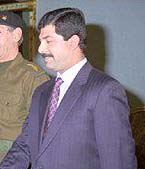 |
| Vol. 2 No. 1 | January 2000 |
As final status talks between Israel and the Palestinian Authority (PA) shift into high gear, American officials have raised a number of proposals in recent months involving the transfer of Palestinian refugees in Lebanon to other countries in the region. The perception in Washington is that no final Israeli-Palestinian settlement is possible without a solution to the problem of Palestinian refugees outside the West Bank and Gaza Strip. While PA Chairman Yasser Arafat remains officially committed to the refugees' "right of return" to areas within Israel and the occupied territories and Israel remains officially opposed, U.S. sources have indicated that both have agreed in principle to an arrangement whereby a small minority will be repatriated in PA-controlled territory and the majority resettled in other Arab countries. But where?
The first, and most viable, proposal introduced by American officials dates back to late 1993: the transfer of Lebanese refugees to Iraq, which will grant them full citizenship in exchange for the lifting of economic sanctions against the country. Although Iraqi officials have publicly objected to this quid pro quo, few believe that President Saddam Hussein will pass up the opportunity to cast himself simultaneously as savior of the peace process and guardian of the Palestinian refugees. Welcoming the Palestinians would not only rehabilitate his stature internationally, but would also strengthen his claim to leadership of the Arab world.
 |
| Qusay Hussein |
A second proposal involves the transfer of Palestinian refugees to the oil-rich Arabian Gulf monarchies. According to a congressional source contacted by MEIB, the proposal was first introduced in 1997 by a congressional staff delegation to the six Gulf Cooperation Council (GCC) member states led by Deborah Bodlander, assistant to Chairman Benjamin Gilman (R-NY) of the House International Relations Committee. According to the source, their reaction was "cautiously" negative. While the entry of a small number of highly-trained Palestinians would be welcome, GCC officials see the transfer of large numbers of refugees to the Gulf states as a potential danger to their political stability.
A third plan, introduced very recently, entails the transfer of Palestinian refugees to the al-Azraq region of southern Jordan, near the border with Saudi Arabia. Jordan would be offered the cancellation of its $7 billion debt and a considerable economic aid package in exchange for granting them citizenship and to cover the costs of providing them with health care and other social services.3 King Abdullah II has already announced his intention to grant full citizenship to all Palestinian refugees currently residing in the Kingdom.
If none of these plans work out, however, American officials will reluctantly seek to arrange the naturalization of most refugees in Lebanon itself. While this would meet with virtually universal disapproval among Lebanon's political class, it is believed that Damascus and its client regime in Beirut can be persuaded to back the idea in return for economic aid.
It should be noted that all major Palestinian political groups in Lebanon have publicly opposed naturalization within Lebanon, as well as resettlement elsewhere in the Arab world.
1 Al-Ayyam, 18 October 1999.
2 See "Israel Reportedly Opens Secret Negotiations with Iraq," Middle East Intelligence Bulletin, December 1999.
3 Jordanian officials contacted by MEIB declined to comment on whether they have received such a proposal.